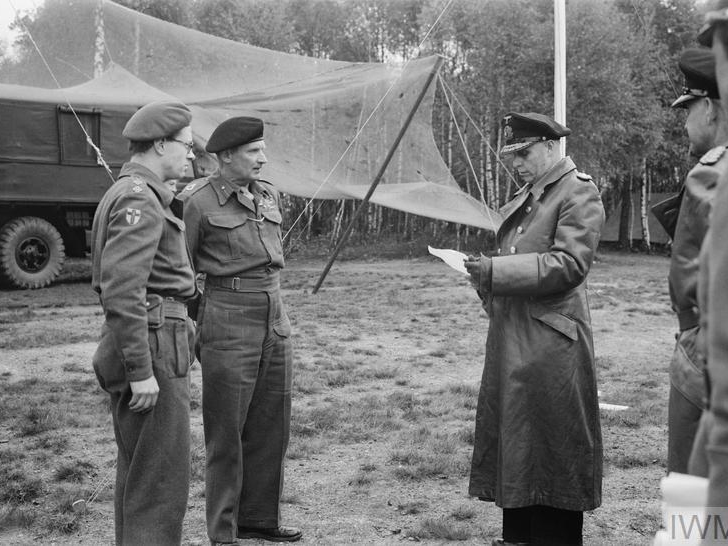We would like to monitor how you interact with this website so we may continue to improve it.
With the news that Adolf Hitler had committed suicide in his bunker on 30th April, and that the city of Berlin had fallen to the Russians on the 2nd May, people across Britain were confident that the war in the West was finally coming to an end.
No-one however knew when Victory would be declared.
In the power struggle after Hitler’s death, his appointed successor Grand Admiral Karl Dönitz of the German Navy became the President of Germany. He immediately sought to negotiate a surrender with the Western Allies, hoping that as many servicemen and civilians as possible could avoid having to surrender to the Russians.
In the early morning of Friday 4th May 1945, a German delegation arrived at Field Marshall Sir Bernard Montgomery’s headquarters at Luneburg Heath, near Hamburg, seeking to meet with the famous British commander. Monty, as he was nicknamed, listened patiently to Döntiz’s messengers before accepting the unconditional surrender of German forces in the Netherlands, Northwest Germany and Denmark. This partial surrender was quickly written down, and signed at 02:42 am.
Hartlepool people’s greatest concern on this day, however, wasn’t for the official negotiations taking place in Europe. Instead, they were concerned with the availably of food for any forthcoming Victory celebration.
Since the 8th January 1940 bacon, butter and sugar had been rationed, with meat, tea, jam, biscuits, breakfast cereals, cheese, eggs, lard, milk, and both canned and dried fruit subsequently being added to the list. While by 1945 the public had become reluctantly used to the rationing of some basic foods, and with a monotonous diet, the promise of the end of the war raised hopes that this may soon be a thing of the past.
.

In early May the Ministry of Food reacted to these concerns by issuing a series of press releases reassuring the British public that adequate supplies of food would be available for any forthcoming victory celebrations. They advised that shop owners should remain open for a few hours during “The V Holiday”, whenever that day finally arrived. Bakers however were only allowed to sell bread, while retailers of perishable goods had to stay open until they have sold the entirety of their stock.
Printed in every newspaper, including the West Hartlepool based Northern Daily Mail, the Ministry of Food’s constant statements had the opposite effect to reassuring the public, as they were taken by many to confirm the rumours then going around about future storages of food, especially milk, eggs and cakes.
Despite these worries many organisations started planning their activities for the forthcoming celebrations over “the Victory Holiday”. Town and parish councils across the Borough commenced preparation for civic parades and church services of thanksgiving, while many local churches scheduled to be open whenever the news of Victory came through.
In West Hartlepool the town clerk, Eric Waggott, started organising a “Victory Tea Party” for returning ex-Prisoners of War and their families.
Music performances and dance halls also began to be booked in readiness. For example, Hartlepool’s “Band’s and Recreation Committee” approved a request from music promoter Mr Fred Mcloughlin to reserve the Borough Hall for dancing and entertainments on VE Day and the following three nights, whenever these days might come
Borough Hall

